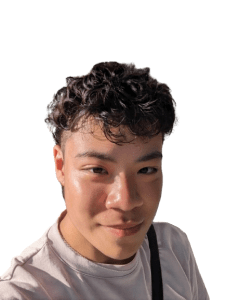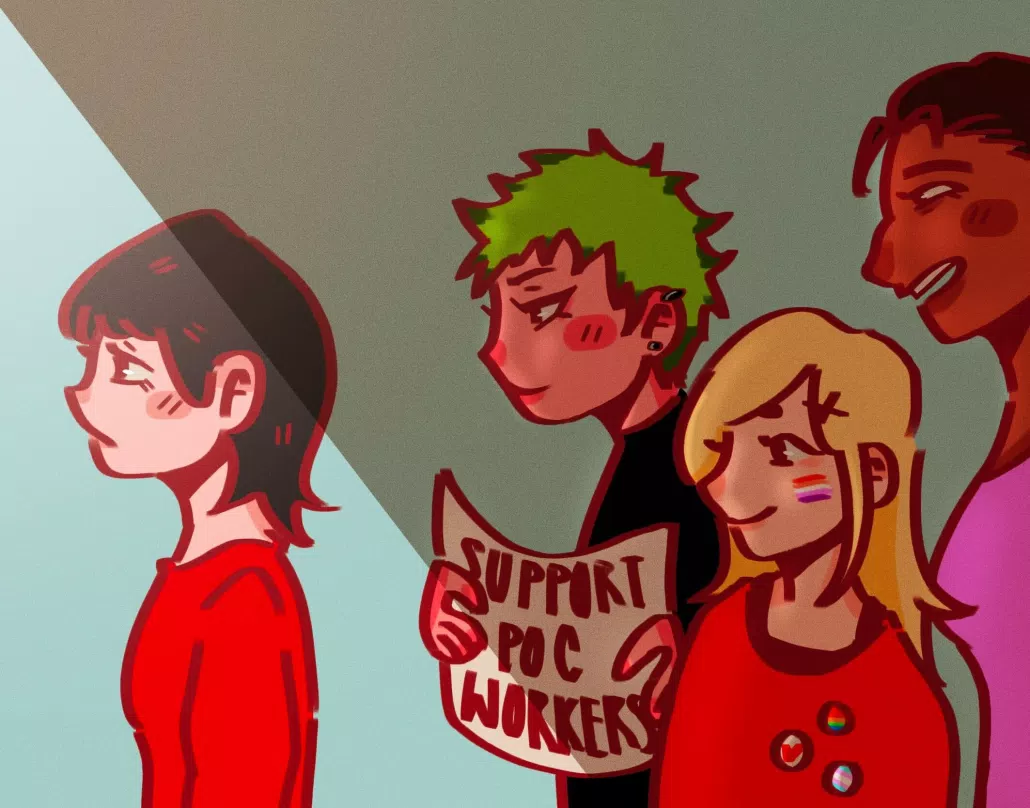EDITORS’ EPILOGUE
I’m not counting on DEI
I’m the director of Diversity, Equity and Inclusion at the Daily Trojan.
I’m the director of Diversity, Equity and Inclusion at the Daily Trojan.


I’ll be the first to admit that I love cracking a good joke about diversity, equity and inclusion. Not because I don’t take my job seriously, nor because I don’t think DEI is a worthy endeavor. But rather, because I feel deeply self-conscious that there is truth to every major accusation against DEI: that it is performative, bureaucratic and generally neoliberal propaganda bullshit.
My former experiences in DEI, such as social justice education, have all forced me to question why I bother in the first place. For example: Why am I teaching people to not be racist? For someone who wishes to commit their life to advocacy and changemaking, DEI can feel anything but actionable or conducive to systemic change.
Unlike material undertakings such as changing the law, the labor of DEI is characterized more by having … conversations. Releasing statements. Putting on a workshop. Celebrating a heritage month. I’m not surprised by the disdain for DEI on both the political left and right when it can appear to be mostly lip service.
That need not always be the case, and it isn’t: For decades, efforts to secure stronger rights and counter discrimination in the workplace have developed alongside civil rights and social justice movements. Despite the cultural panic and anti-DEI legislation introduced by conservatives — “DEI must DIE.” — DEI is but one iteration of movements to make the workplace more egalitarian.
Far from radical, however, DEI can serve as a tool for large organizations to demonstrate they care under intensifying public pressure over social issues, even as they balk at implementing sorely needed changes to their entire organizational structure. I frequently hear leaders call for more integration of DEI into all the work their organization does. But I don’t think they understand what that actually means.
No amount of diversity training can serve as a replacement for leadership and accountability. When incidents arise — and bias is severely underreported — how leadership adjudicates consequences, affirms care for those affected and communicates how business will be done differently in the future sends a far more powerful message than any kind of workshopping ever will.
In progressive-ish places like USC, incidents often become another conversation: We say “what a shame” to similarly enlightened peers, implicitly agreeing that we would never do or say such things, and then carry on — never addressing why a problem happened. We’re woke, right? Too bad for the ignorant bigots.
But assuming that we all know better does not make it so. We are all liable to make mistakes — and we are all responsible for accountability when someone does something wrong.
Asking why is one of the most crucial tools we have to create change. Before we can hold a productive dialogue or educate others, we have to ask both why someone is impacted by certain words and actions and why someone said or did those harmful things.
In our newsroom, asking why is also one of the most important journalistic questions. I’ve observed that acknowledging rampant bias and discrimination exists can seem antithetical to journalists used to the principle of assuming innocence. But while we may not always understand how systemic injustices translate into a person’s daily experience, we know bias exists nevertheless.
When we fail to fully consider the depth of those systemic problems, we tend to shut down people who are already at a disadvantage from speaking up. So, I challenge my peers to reframe the problem of objectivity as a question of journalistic integrity: If someone tells you, for instance, there is transphobia in the newsroom, will you use your journalistic inquisitiveness to ask why? Do you have the skills of a journalist to search — sensitively — for the evidence?
Journalists hold immense power because they are in the business of choosing what information goes where, and how. We are privy to exceptionally difficult choices, including, at times, the choice between moving our own careers ahead and standing up for what is right — or, at the very least, publishing the truth.
But these choices present themselves every day in ways we cannot easily see. If we truly understand our roles in the civic sphere, then we must have the humility to consider, on a more profound level, which perspectives are missing in our work, and why.
I won’t be the DEI director for much longer. But wherever I go, I will continue to push people to recognize they have that power to choose, journalist or otherwise. And it shouldn’t take a DEI department for us to have the courage to use that power the right way.
“Editors’ Epilogue” is a rotating column featuring a different Daily Trojan editor in each installment writing about their personal experiences. Antonio Wu is a junior majoring in public policy with a minor in justice, voice and advocacy and is the DEI Director at the Daily Trojan.
We are the only independent newspaper here at USC, run at every level by students. That means we aren’t tied down by any other interests but those of readers like you: the students, faculty, staff and South Central residents that together make up the USC community.
Independence is a double-edged sword: We have a unique lens into the University’s actions and policies, and can hold powerful figures accountable when others cannot. But that also means our budget is severely limited. We’re already spread thin as we compensate the writers, photographers, artists, designers and editors whose incredible work you see in our daily paper; as we work to revamp and expand our digital presence, we now have additional staff making podcasts, videos, webpages, our first ever magazine and social media content, who are at risk of being unable to receive the support they deserve.
We are therefore indebted to readers like you, who, by supporting us, help keep our paper daily (we are the only remaining college paper on the West Coast that prints every single weekday), independent, free and widely accessible.
Please consider supporting us. Even $1 goes a long way in supporting our work; if you are able, you can also support us with monthly, or even annual, donations. Thank you.
This site uses cookies. By continuing to browse the site, you are agreeing to our use of cookies.
Accept settingsDo Not AcceptWe may request cookies to be set on your device. We use cookies to let us know when you visit our websites, how you interact with us, to enrich your user experience, and to customize your relationship with our website.
Click on the different category headings to find out more. You can also change some of your preferences. Note that blocking some types of cookies may impact your experience on our websites and the services we are able to offer.
These cookies are strictly necessary to provide you with services available through our website and to use some of its features.
Because these cookies are strictly necessary to deliver the website, refusing them will have impact how our site functions. You always can block or delete cookies by changing your browser settings and force blocking all cookies on this website. But this will always prompt you to accept/refuse cookies when revisiting our site.
We fully respect if you want to refuse cookies but to avoid asking you again and again kindly allow us to store a cookie for that. You are free to opt out any time or opt in for other cookies to get a better experience. If you refuse cookies we will remove all set cookies in our domain.
We provide you with a list of stored cookies on your computer in our domain so you can check what we stored. Due to security reasons we are not able to show or modify cookies from other domains. You can check these in your browser security settings.
These cookies collect information that is used either in aggregate form to help us understand how our website is being used or how effective our marketing campaigns are, or to help us customize our website and application for you in order to enhance your experience.
If you do not want that we track your visit to our site you can disable tracking in your browser here:
We also use different external services like Google Webfonts, Google Maps, and external Video providers. Since these providers may collect personal data like your IP address we allow you to block them here. Please be aware that this might heavily reduce the functionality and appearance of our site. Changes will take effect once you reload the page.
Google Webfont Settings:
Google Map Settings:
Google reCaptcha Settings:
Vimeo and Youtube video embeds:
The following cookies are also needed - You can choose if you want to allow them:
